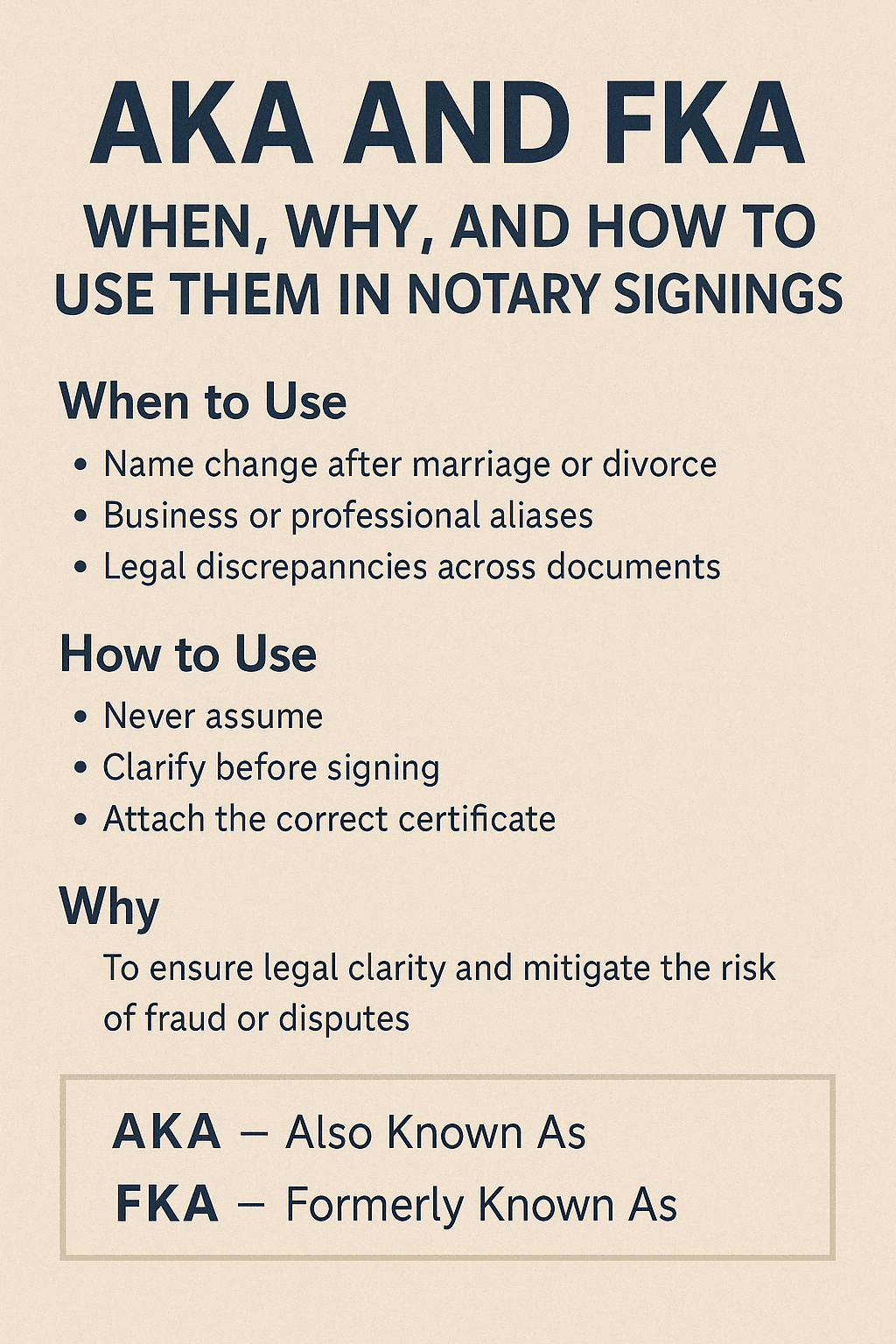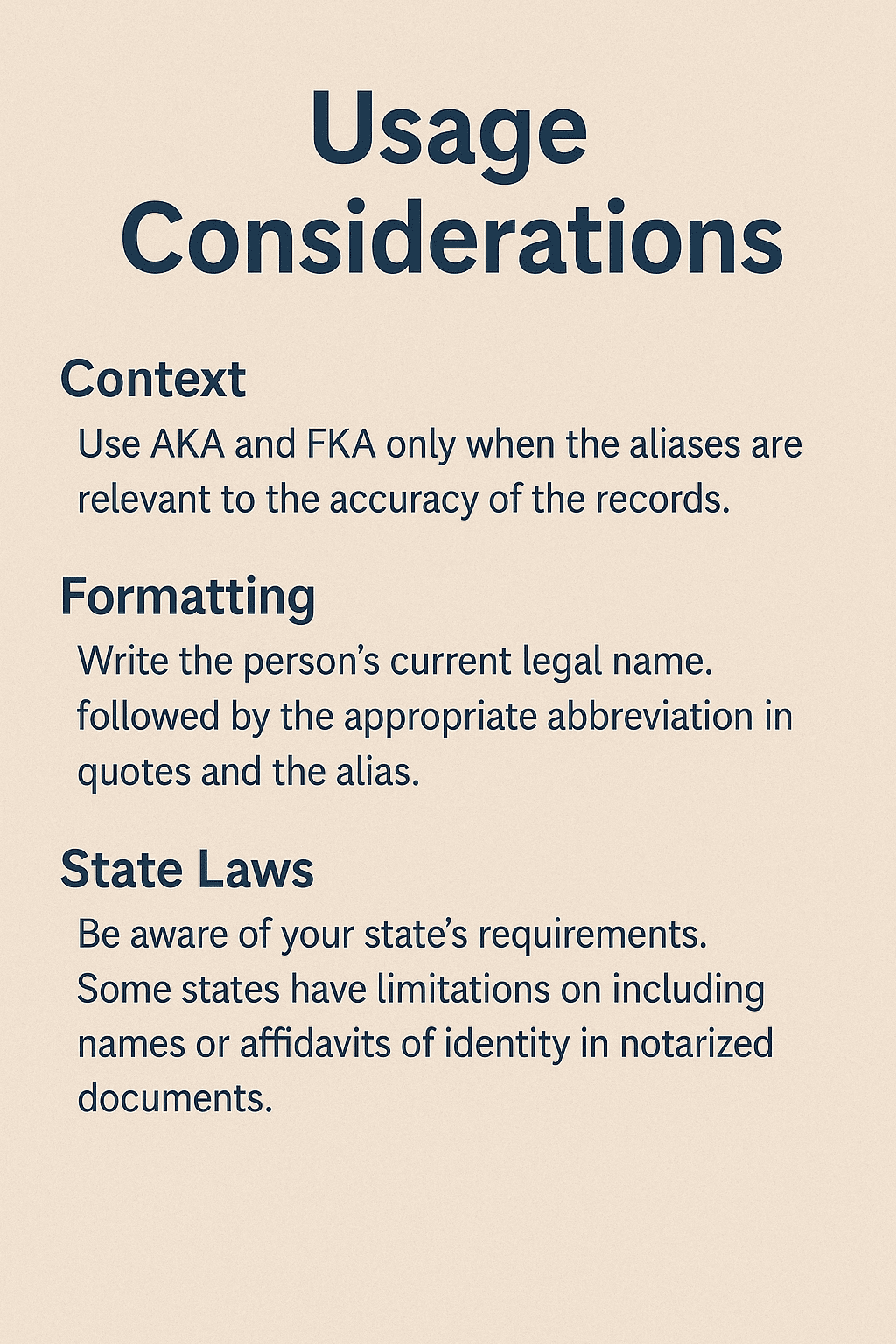AKA and FKA: When, Why, and How to Use Them in Notary Signings
In the notary world, confirming the identity of a signer is a cornerstone of ethical and legal practice. Yet, names aren’t always consistent across documents. Whether it’s due to marriage, divorce, professional aliases, or cultural name changes, signers often have variations of their legal name. That’s where “AKA” (Also Known As) and “FKA” (Formerly Known As) come into play.
Let’s break down what these terms mean, why they matter, and how to handle them properly in your notary business.

What Do AKA and FKA Mean?
AKA — Also Known As
This designation is used when a person is recognized by more than one name. For example:
“Jane Marie Smith AKA Jane M. Johnson”FKA — Formerly Known As
This term applies when a signer has legally changed their name. For example:
“Sarah Lynn Taylor FKA Sarah L. Washington”
These identifiers help create a clear trail of identity and protect against fraud or confusion in legal and real estate documents.
When to Use AKA and FKA in Notary Work
Name Change After Marriage or Divorce:
When a signer has recently changed their last name and a document lists their prior or current name.Business or Professional Aliases:
For professionals known by a maiden name or stage name that differs from their legal ID.Legal Discrepancies Across Documents:
When one document reflects a previous name and another shows a new name, but both refer to the same person.Title or Real Estate Transactions:
Especially important in deed signings or affidavits, where the chain of identity must be traceable and precise.
How to Use AKA and FKA Correctly
Never Assume — Always compare the name on the document with the ID presented. If there's a discrepancy, ask the signer about it and determine if an AKA or FKA clarification is needed.
Clarify Before Signing — If a document needs to reflect both names, it should already include the AKA or FKA designation. As a notary, you do not create these designations; your role is to notarize based on what’s presented.
Attach the Correct Certificate — If a document includes an AKA or FKA, ensure your notarial certificate matches the name as listed on the document. Do not alter names to fit ID without proper documentation.
ID Must Match at Least One Name — You must identify the signer based on the name on the ID. If their ID does not show both names, but the document does, attach a notarial certificate using only the name shown on the ID and note the discrepancy in your journal.

Why This Matters
Using AKA and FKA properly protects all parties involved—signers, document recipients, and you as the notary. It ensures legal clarity and mitigates the risk of disputes, fraud, or rejected paperwork.
Improper use—or omission—of these identifiers can delay real estate closings, probate filings, or business transactions. By educating your signers and knowing how to handle these name differences, you show your professionalism and strengthen your role as a trusted notary public.

Final Thoughts from the CEO’s Desk
As a Notary Public, understanding name variations isn't just helpful—it’s necessary. Whether you're handling a power of attorney, a property transfer, or a simple affidavit, make sure you recognize when AKA or FKA should be present and documented properly.
If you ever encounter a document where the signer's name appears in an unfamiliar way, pause and ask the right questions. Then, proceed only when you’re confident their identity and document are legally aligned.
Need help interpreting a name issue on a document? That’s what professional notaries are here for. Connect with a certified Florida notary like myself, and let’s keep your transactions secure and compliant.

